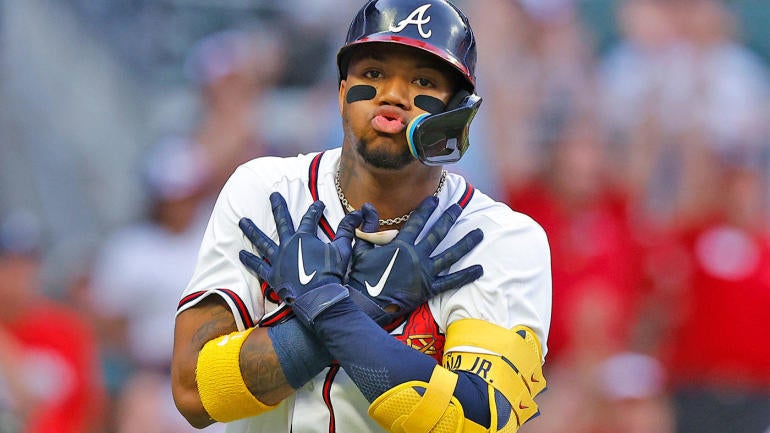2020 Fantasy Baseball Draft Prep: How the Scott White Dynasty League came to be and how you can have your own
Want to create the perfect dynasty league? Scott White gives the backstory of his dynasty league and why it works.

Below is the story of the Scott White Dynasty League and a defense of its policies. If you'd like to jump straight to the constitution for guidance in setting up your own dynasty league, you can do so by clicking on this link.
This article was original published March 30, 2020, so any references to specific players should be judged in that context.
It was 2012, and I was frustrated.
I had always understood Fantasy Baseball to be a way to live out our GM fantasies, but after taking part in dozens of redraft leagues year after year, I recognized that we had strayed pretty far from that ideal.
A GM's job is less about playing to the moment and more about executing a long-term vision. It's less about buying and selling and more about building and maintaining. Fantasy Baseball had given us a vehicle for scoring individual player contributions in real time, and we were reducing it to a game of "did I pick the right players?"
We could do better, I thought, but it sure seemed like nobody had yet.
Naturally, I had tried my hand at dynasty leagues by that point, but none of them seemed to get it right either. They always seemed to focus on the wrong things, creating an incentive structure that rewarded hustle over discipline. It was basically like playing in another Fantasy league ... plus prospects.
Of what actual value were those prospects? Opinions were divided on that matter. Some participants valued them like a real-life GM would. They so wanted this dynasty league to be like the real thing that they treated top prospects like the most prized assets, and savvier participants would take advantage, dealing away their own prospects to stockpile actual difference-makers for the playoff push. But what they were giving up was imaginary, a mere tribute to every fan's obsession with The Next Big Thing. Absent the economic underpinnings of the real game, these prospects were mostly hype, and so these mass sellers never ended up facing the sort of long-term consequences a real-life GM might. This wasn't my idea of planning and maintaining. This was a rat race.
See, what makes a prospect so valuable isn't that he's young or thought to have high upside. The theoretical should always take a back seat to the actual when the cost is roughly equivalent. It's like the mystery box analogy colleague Chris Towers is always citing from Family Guy: "A boat's a boat, but the mystery box is anything. It could even be a boat!" But again, that's only when the cost is equivalent, which is too often the case for prospects in dynasty leagues. What makes a prospect so valuable in real life is that he's practically free and will be for years to come.
When your best players are also your cheapest players, that's the foundation for a dynasty. It allows for a better supporting cast, a wider window for contention and more leeway to make mistakes. But getting there requires long-term planning, careful maneuvering and a commitment to a cause. Those are the qualities a dynasty league should reward, and so that's the dynasty league I set out to create.
I should point out that I didn't go about this task confidently. I didn't fancy myself as some sort of game designer, which may seem like a lofty way of putting it, but dude, games are a big freaking deal to me. I'm something of a board game enthusiast, and I'm not talking Risk or Monopoly but the kind of games you used to find only in hobby shops. These Eurogames, as they're typically known given that they often originate in Germany, rise above the fray with their streamlined mechanics, minimized luck and high levels of engagement. If you've played The Settlers of Catan (which has since been rebranded as simply Catan) or Ticket to Ride, then you've at least dipped your toe in the water, but they get much more involved from there.
The designers of these sorts games (Agricola, Puerto Rico and Splendor being just a few of my favorites) are all geniuses in my eyes. The cohesion found within their rulebooks, the balance they achieve with not a single detail wasted and every possible discrepancy and potential landmine accounted for, makes for games that are brilliantly put together, impossibly addictive and unfailingly rewarding. Sometimes I lay awake at night just attempting to deconstruct them.
One such night, a question came to mind: What if someone took the scoring vehicle of Fantasy Baseball and applied the streamlined sensibilities of Eurogames while creating an economy that better approximated the actual GM experience? It'd be the league to end all leagues! So shouldn't someone have already done it by now?
I looked around the room and caught my reflection in the mirror, looking right back.
Well, why not me? I'm supposed to be one of the leading voices in the Fantasy Baseball space, being a writer for CBS and all. Isn't starting leagues just one of the things we do?
Yeah, but this one sounded daunting. And intensely personal. I wasn't just looking to complete an assignment, after all. I wanted my dream league, and I wasn't sure I was the right man for the job. It's one thing to say you want a dynasty league that operates like a Eurogame. It's quite another thing to make one. I was sure I'd overlook some crucial detail that would expose some loophole or render some aspect of the game ineffective or undermine that realistic economy I was trying to build. And then what? Would I bow out of my own league? Would I play out the string on a failed experiment just for everyone else's sake? No, I had to get it right the first time.
So I spent a year just thinking about it. Whenever I had a spare moment — in the shower, in a waiting room or wherever — I'd think through possible rules and their ramifications. I'd test hypothetical scenarios for best- and worst-case outcomes. I'd consider what worked in other dynasty leagues and what prevented them from being better. I'd weigh the factors a real-life GM had to consider, striking down the ones that seemed superfluous while highlighting the ones that got to the core of the matter. I did this for a year.
And then I wrote a constitution, which you can find in full detail here.
The highlights? Well, if I had to reduce my priorities to only six, it would be these:
- Make prospects as valuable as in real life.
- Make the rules accessible and the learning curve gentle.
- Minimize commissioner legwork so that I don't come to resent it or view it like a second job.
- Use Head-to-Head points scoring.
- Promote trading, but not in a way that reduces the league to a rat race.
- Don't turn the rulebook over to the masses.
So let's address them all, one by one.
Make prospects as valuable as in real life
I've already summed up what makes prospects so valuable in real life. It's not just that they could be good. It's that if they are, they're also basically free for the first three years — and they may be discounted for as many as seven. The options available to a GM when he has multiple such players are vast and difficult to mess up, frankly, provided he doesn't start trading them all away. It's why the full-scale rebuild has become so popular among real-life GMs.
Thinking through all the ramifications there, I came to realize two things about my league:
- It needs a salary structure.
- It needs salary progression to be layered, beginning slow before escalating quickly.
Probably makes sense to do an auction, then, right? I wouldn't say it's required, but it makes salary considerations much more straightforward. It allows for greater disparities in salary, too, since assigning salaries to draft slots puts artificial barriers on things. We use the traditional $260 budget.
OK, so players are distributed via an auction, and their cost becomes their starting salary. But wait, wouldn't there be a bidding war for the prospect, thus inflating their starting salary? What happened to them being free, Scott?
That's why we distribute them separately from the auction, via a minor-league draft. The players selected there — and just for simplicity's sake, I limit it to those with no major-league experience — are assigned a salary of $0. It remains $0 for as long as his GM keeps the player in one of the team's 10 minor-league slots, and that GM can keep that player in that slot for as long as he wants. But once he promotes the player to the active roster, that $0 salary goes to $1 and doesn't go back. The player can't go back in a minor-league slot. He has begun his journey on the salary escalation scale.
So how does that work? The first year you keep a salaried player (so not those still in a minor-league slot), his salary goes up $1. The second year, it goes up $3, and for each year thereafter, it goes up $5. This applies for all players, regardless of whether they were purchased in the auction or promoted from a minor-league slot, but you can see how it corresponds to the salary of a promoted prospect in real life. The first three years are essentially free ($1, $2, $5). The next three years are still discounted, presuming the player is actually good ($10, $15, $20).
Things escalate pretty quickly from there, to the point you'll eventually have to make a tough decision over whether to keep the player. But by then, your investment has already paid off. You got a good, lengthy run with him as cheap part of your nucleus. It would take a pretty short-sighted GM to forgo that for a quick score, which is the conventional wisdom in real life as well.
I could have, of course, added various complications that would reflect real life even more, such as long-term contracts or some sort of arbitration simulation or requirements to move a player off the minor-league roster by a certain date. But that would conflict with my second priority.
Make the rules accessible and the learning curve gentle
The goal of this game, as should be true for any game, is to have fun. You can't go so far down the path of hyper realism that it ceases to be fun. None of us is auditioning for an actual GM job here, so we don't need to get bogged down in all the minutiae that's essential to their job. The right things need to be rewarded, yes — the emphasis, again, should be on long-term planning and budget management — but it needs to be streamlined, just like with those Eurogames.
So you can keep your Rule 5 drafts and your service time counters and your non-tender rules. You can buy a baseball simulator like Out of the Park if you really can't live without that stuff. But what's more rewarding is having a large group of equally committed people, and those trivial details just aren't compelling enough for the majority of the Fantasy-playing population.
More than anything, a healthy dynasty league requires everyone to buy in. I don't mean literally — I'm not saying you have to play for money, and in fact, we don't — but everyone has to be committed to the cause. And the more complicated the rules, the more inaccessible it becomes for people who, you know, don't have time for an actual GM job.
"What is that, an excuse to slack off? We don't need people like that in our Fantasy league anyway!" OK, but you probably have a limited pool to draw from. And people who might otherwise become addicted if you give them a chance are just going to check out if you bury them in rules right away.
Another way dynasty leagues can become inaccessible is if they penalize GMs too harshly for their mistakes, putting them so far out of the competitive cycle that it'll take years for them to recover. Now, I realize this can happen in real life, and I am trying to approximate a real GM experience here. But certain trade-offs are necessary for the health of a league, and again, the goal is ultimately to have fun. Few wannabe GMs are going to stick around when they're destined to lose for years to come. There has to be a quicker way out of it. There has to be some light at the end of the tunnel, and when there is, a rebuild can actually be quite rewarding.
It's the main reason why we don't have long-term contracts. You can shed that dead weight any time you want and free up that budget space for something that'll set you on a better path. It's still difficult. You'll still have to come up with some legitimate low-dollar players to have any hope of contending, but there are some workarounds for that, too. You can bid on minor-leaguers in the auction if you don't want to wait around for the minor-league draft. It puts them on the salary escalation scale right away, which means you'll need them to be called up within the next couple years, but it's a shortcut to replenishing a system that's been tapped dry.
There's also the waiver wire. FAAB runs every night, and the winning bid becomes the player's starting salary. Someone last year picked up Max Fried for $2 before the start of the season. It's looking like that move will pay off for years to come.
Minimize commissioner legwork so that I don't come to resent it or view it like a second job
If this sounds like a copout to you, you've never been a commissioner before. It is thankless. It is burdensome. It is as difficult as you allow it to be.
So don't. Don't make a job out of it, at least as much as you can help it. Part of a commissioner's role is to be the league's biggest cheerleader, so it's not good for the health of the league if your enthusiasm for it is compromised. It certainly isn't if you're so overburdened that you quit.
I didn't write up this league's constitution in a vacuum, basically. I had a leg up in this regard, having set up dozens of CBS Commissioner leagues over the years and, thus, having a pretty good idea of all the different ways the rules could be manipulated. Where I didn't, I checked and adjusted as needed. It mostly runs on its own now, with only a few instances where I'm having to update salaries manually. Otherwise, I'm just coordinating dates, interpreting rules, resolving conflicts ... that sort of thing.
I've played in dynasty leagues where the commissioner has to be so hands-on with every step of the process that it's exhausting just to watch him. And oftentimes, a slight tweak of the rules would save him that trouble without greatly altering the mechanics of the league.
Plus, in the case of my league, I made it mostly for me. If I was so bogged down in administrative tasks that my roster was falling into ruin, it would defeat the purpose.
Use Head-to-Head points scoring
This will be a turnoff for some, and look, you can still follow the same basic framework for this dynasty league using a different scoring format. But I'm going to make the case for why it's best suited for Head-to-Head points (which happens to my favorite scoring format) and just ask that you hear me out.
Did I mention the league is 24 teams deep? I realize that's not plausible for everyone, but it's ideal. And if you have to take to social media seeking out strangers to meet that target, it's worth it. For the prospects in your dynasty league to have comparable value to their real-life counterparts, there has to be a talent void. The league can't be so shallow that problems are easily resolved via the waiver wire.
Then again, the size of the league presents some other complications if it uses traditional 5x5 scoring, be it Rotisserie or Head-to-Head. And actually, Rotisserie should probably be a no-go just because of its anti-competitive nature. What percentage of the 24 teams are going to stay engaged deep into the year if there's no playoff scenarios and only two or three teams are vying for the top spot?
So let's just say it's a Head-to-Head categories league with traditional 5x5 scoring. What kind of warped value are the base-stealers going to have when they're distributed among 24 teams? Their cost has already been inflated beyond anyone's comfort level in leagues half that size, completely losing sight of what it means to be a good player.
Do you really want to have to approach Jonathan Villar like he's the hottest thing on two feet? In your dynasty league ... really? Do you want to have to run every prospect evaluation through the prism of how likely or unlikely he is to give you stolen bases? Is this something any real-life GM is doing in 2020?
It's dumb. I'm sorry, but not really, because it is.There are plenty of ways to measure how good a player is, and base-stealing ability is among the least of them. Points scoring accounts for all of those ways — extra-base hits, on-base ability, strikeouts, etc. — and it does so in a way that's proportional, with home runs being more valuable than stolen bases. It doesn't limit the scope of the contributions it measures and then weigh them according to scarcity so that something like stolen bases can become inflated just because of it's out of style — the irony, of course, being that it's out of style because it's not that valuable!
The strength of your team should be measured by the quality of its players and not how likely it is to meet statistical baselines. There are more paths to contention when contention isn't reliant on a limited number of players still delivering on an outdated skill, and the outcomes in your league will be far less random if you know that anything good a player provides is ultimately good for your team's bottom line.
Promote trading, but not in a way that reduces the league to a rat race
Trades are the lifeblood of a dynasty league. They force contenders to grapple with how far they're willing to go to improve their title chances, and they keep the non-contenders engaged deep into the summer months. They're also the most efficient way to reshape a roster, and let's be honest: When we fantasize about being a GM, we mostly think about the trades.
You gotta have 'em. A dynasty league where no one is trading is a dynasty league at death's door.
It may surprise you, then, to learn that the Scott White Dynasty League doesn't permit offseason trading. It's been a sticking point for me, as a matter of fact. Former colleague and bona fide Fantasy Baseball celeb Nando Di Fino, who has never been one to rationalize away a good time, has been leading a campaign to institute offseason trading, and Chris Morales, one of our most aggressive traders, took to new levels last year, enlisting the help of Trevor Story and Francisco Lindor.
I mean, this is impressive:
And this is doubly so:
But I won't be moved by mere celebrity. I actually believe the elimination of offseason trading has been critical to the health of the league.
I've referred already to the "rat race" that so many dynasty leagues are reduced to, and by that I mean some of the more restless GMs with a high tolerance for rejection can just dominate the league with high-volume, circular trading. And by that, I mean cashing in all of their prospects for a bunch of immediate contributors they know they won't be able to keep, only to turn around and trade those unkeepables for prospects in the offseason. So it was like a rental, or not even since it didn't cost them anything in the end. Winning a championship for them is like checking out a book from the library.
And I recognize there's skill in that — great hustle is on display — but it's not a skill I'm so interested in rewarding in my dynasty league, where, again, the emphasis is on executing a long-term vision. if you trade a prospect for a quick score, you should have to live with the consequences. They should sit with you the next year and for years to come. It's a sacrifice that should force you to question whether it's worth it or not, and the decision should be made with the understanding that the thing that's being forfeited can't just be plastered over later.
Turns out it has other benefits, too. One of the measures I've taken to both facilitate trading and make my life as a commissioner a little bit easier is to relax the salary cap in-season. Every team must have a combined salary of no more than $260 at the start of the year, but they can run it up as high as they want once the season begins. They'll have some tough keeper decisions to make in the offseason, of course, especially since they won't be able to shed salary after the fact, but it's actually doing the rebuilders a favor, encouraging more bidders and a higher return, when they can move a high-dollar player without taking one back.
Moreover, because every player's salary is set to escalate in the offseason (and by as much as $5 a pop), nobody is operating under the presumption he can keep everybody, so for contenders and non-contenders alike, there's this secondary tension of addressing next year's budget at the trade deadline.
It makes for a wild day of wheeling and dealing.
Of course, a lot of this would be lost if there was offseason trading, and it seems like most of the league recognizes this.
From Brady Gardiner, an inaugural member and executive producer for SiriusXM Sports:
"I actually think it's a good thing. If you and your $600 teams could unload your over-cap salary for value in the offseason, then I'd never get out of 15th place."
From Tanner Tedeschi, an inaugural member:
"A lot of the league wants to be able to trade in the offseason, and it's a running joke to push for it. I don't, though. I think it keeps people active during the season before the trade deadline and also puts that much more importance on the best day of the year, the auction."
From Jameson Fleming, an inaugural member and chief of staff at Adweek:
"I support the offseason trading ban. It would make it impossible for teams to rebuild if we had it."
From Ellen Adair, second-year member and actress from Homeland, The Sinner and Billions:
"Does this have to be public? I don't want to get yelled at. You can say there was an anonymous dissenter to those lobbying for offseason trading. I don't want offseason trading. I like it the way it is."
Even Chris Morales, for all his cheap shots and paid stunts, knows it's in the league's best interest to keep it like it is:
"Format-wise, it makes sense to not have any offseason trading as that'll ensure there is some level of quality back in the auction pool."
You see? There's no dissension in the ranks. In fact, there's been remarkably little discord thanks to how well these league's rules work together. You notice how almost everybody quoted here is an inaugural member? In seven years' time, we've only had six teams change hands. Yes, less than one dropout per year in a 24-team league. That's an unbelievable retention rate.
And it backs up my next point completely.
Don't turn the rulebook over to the masses
I can't emphasize this one enough.
Even if I wasn't offered those reassurances about offseason trading and was only hearing from the dissenters about how great it would be, the proper response wouldn't be to put it up for a vote.
I know. We want to be fair. We want to be accommodating. We've all been conditioned to believe the majority rules, and we want the consent of the governed, after all. But you know what? They already consented by joining the league.
It's my league, gosh darn it. I invited them, and I'm showing them a good time. And the way I know I'm showing them a good time is because they're still here.
Honestly, this was one of my biggest hesitations before committing to this league, the fear that an angry mob would begin chiseling away at my rules. It goes against my nature as a textbook middle child conflict resolver to puff out my chest and say "it is what it is, and you'll like how it is," but what makes the league a good time is that the rules work. They work in harmony, supporting each other to maintain a delicate balance of variables. One seemingly minute detail has an impact on six others, and if you pull on that thread, you risk unraveling the whole thing.
I mean, did the designer of Catan crowdsource his rulebook, putting up for a vote whether there should be three or four ore hexes on the gameboard? No. That'd be absurd, and it'd make for an unbalanced and unfulfilling game. So why would this be any different?
Hear complaints, sure. Weigh their merits. But then swiftly disregard them when they'd interfere with something that works.
That's not to say my constitution hasn't seen any changes in seven years. A couple times, someone has brought something small to my attention that I agreed wasn't working as it should. But these are time-tested rules by now, and there are plenty of others who'd attest to them:
From Nando Di Fino, now with The Athletic but made famous by the Sam Walker book Fantasyland:
"In-season, I might pay more attention to this league than any other. It's fun ... it's like the bounce house of dynasty leagues."
From Scott Maurer, inaugural member and 2013 champion:
"Pretty much all my leagues have a trade deadline, but none of the others turn that deadline into one of the highlights of the season. Last year, there were more trades in SWDL at the deadline than in my other six leagues combined. That's the beauty of dynasty, but some rule setups make this outcome unlikely. I think the magic ingredients are the trade deadline, the auction values and the lack of an in-season salary cap."
From Kayla Van Horn, third-year member:
"The great thing about the SWDL is the crazy depth which requires you to be familiar with basically the entire player pool. Someone joked that anyone with a pulse is an asset in this league, and it isn't much of an exaggeration."
From David Greenman, third-year member and actor from Bones and About Last Night
"This league has given me an opportunity to look at prospects and fringe players in a way 10-, 12-, and even 15-team leagues never could. The typical stars and scrubs approach is much harder when 23 other teams are on top of those $1 players, too."
From Jonathan Norman, inaugural member who shares a team with Chris Morales:
"The league is the toughest to win of all the leagues I've ever played in. So any time two 'everymen' finish ahead of the 'experts,' we're pretty pumped."
And our old buddy Chris Morales again:
"I don't personally know anyone in the league but I know the people in this league. I know how they want to build and how they value players. In my 6-8 leagues on an annual basis, this is the league I crave to win the most. The pride of winning this format speaks more to me than winning a few hundred dollars in my other leagues."
If you've read this far, it's obvious you're interested and I probably don't need to sell the idea any further, but understand that I only do so because it's something that's brought great joy to me. And I'd like for others to share in that joy. So read over the constitution, gather up some friends, and go and have yourselves a rewarding Fantasy Baseball experience that — who knows? — maybe will last you an entire lifetime.
If there was ever a time to take the time to do it right, it's right now.


















